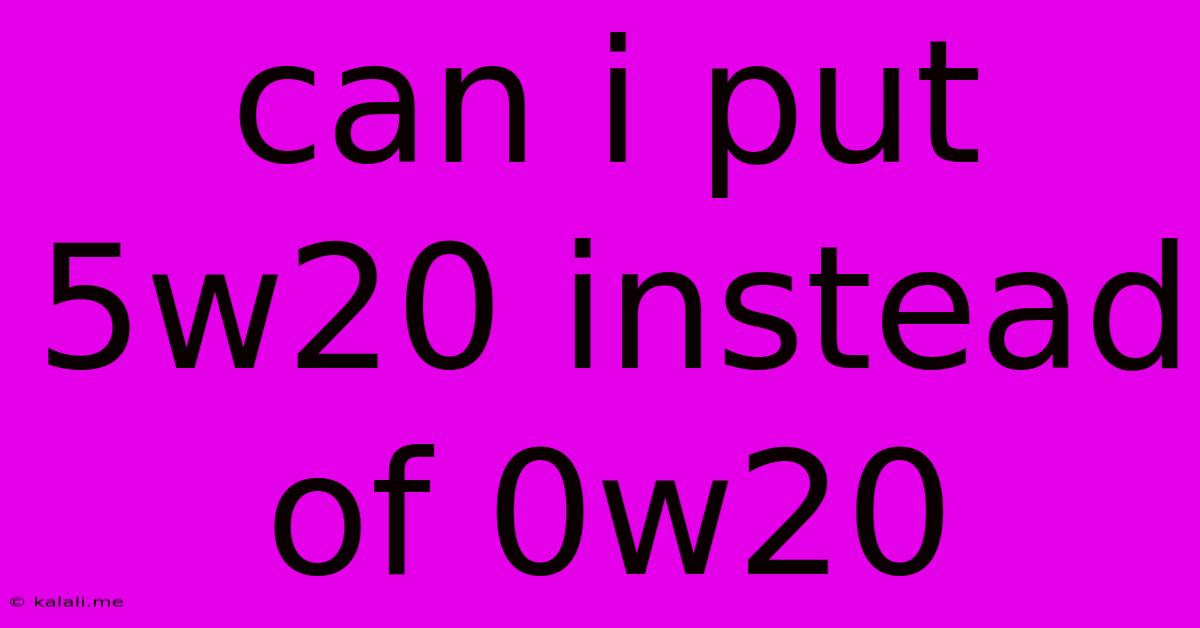Can I Put 5w20 Instead Of 0w20
Kalali
Jun 05, 2025 · 3 min read

Table of Contents
Can I Put 5W20 Instead of 0W20? Understanding Oil Viscosity and Its Implications
This article will delve into the question: can you use 5W20 oil instead of 0W20? We'll explore the differences between these viscosity grades, the potential consequences of using the wrong oil, and ultimately help you make an informed decision for your vehicle's engine. Understanding your car's lubrication needs is crucial for its long-term health and performance.
Understanding Oil Viscosity Grades
The numbers in the oil grade, like 0W20 and 5W20, represent the oil's viscosity or thickness at different temperatures. The "W" stands for "winter," indicating the oil's performance in cold temperatures. The number before the "W" signifies the oil's fluidity at low temperatures; a lower number means better cold-weather performance, allowing for easier engine starting and faster lubrication. The number after the "W" represents the oil's viscosity at higher operating temperatures.
Comparing 0W20 and 5W20
-
0W20: This oil is designed for superior cold-weather performance. It flows more easily at very low temperatures, facilitating quicker engine lubrication upon startup, especially beneficial in extremely cold climates.
-
5W20: While still a relatively low-viscosity oil, 5W20 is slightly thicker at low temperatures compared to 0W20. This means it might take slightly longer for the oil to reach all engine parts when starting in frigid conditions. However, it maintains a similar viscosity at operating temperatures.
Can You Substitute 5W20 for 0W20?
The short answer is: generally, yes, but with some caveats. Using 5W20 instead of 0W20 is often acceptable, especially in moderate climates. Both oils provide adequate lubrication at operating temperatures. However, using 5W20 might lead to slightly increased engine wear during cold starts in very cold climates. The slightly thicker oil at low temperatures may not lubricate all engine components as quickly as 0W20.
Potential Consequences of Using 5W20 Instead of 0W20:
-
Increased Engine Wear (in extremely cold climates): The slightly slower lubrication in very cold temperatures could lead to increased wear on engine parts during the crucial initial moments of startup.
-
Slightly Reduced Fuel Economy: While the difference is often marginal, a thicker oil like 5W20 can sometimes slightly reduce fuel efficiency compared to 0W20, particularly during cold starts.
When to Use 0W20 and When 5W20 Might Be Acceptable:
-
0W20: Ideal for vehicles operating in extremely cold climates where quick engine lubrication at very low temperatures is critical. Many modern engines are designed to run optimally with 0W20.
-
5W20: A suitable substitute for 0W20 in moderate climates or if 0W20 is unavailable. It provides adequate lubrication and protection in most driving conditions.
Always Consult Your Owner's Manual:
The most important piece of advice is to always refer to your vehicle's owner's manual. This document specifically outlines the recommended oil viscosity and other specifications for your particular make and model. Ignoring these recommendations can void your warranty and potentially damage your engine.
Conclusion:
While using 5W20 instead of 0W20 might be acceptable in certain situations, it's crucial to understand the potential implications. Prioritize consulting your owner's manual and consider your climate and driving conditions before making a decision. Choosing the correct oil viscosity is paramount for maintaining the health and longevity of your vehicle's engine. Remember, preventative maintenance is key to a vehicle’s optimal performance.
Latest Posts
Latest Posts
-
How Can You Tell Bad Radiator Fins On A Car
Jun 06, 2025
-
How To Address A Letter To A Family
Jun 06, 2025
-
Furnace Humming But Not Kicking On
Jun 06, 2025
-
Lipo Battery Connected To Motor Controller
Jun 06, 2025
-
What Does Tony Say To Grasso
Jun 06, 2025
Related Post
Thank you for visiting our website which covers about Can I Put 5w20 Instead Of 0w20 . We hope the information provided has been useful to you. Feel free to contact us if you have any questions or need further assistance. See you next time and don't miss to bookmark.